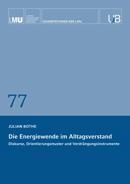Die Energiewende im Alltagsverstand: Diskurse, Orientierungsmuster und Verdrängungsinstrumente
Synopsis
The mitigation of climate change requires a rapid transition to renewable energy - but social acceptance of the energy transition is far more ambivalent than surveys suggest. Based on a series of group discussions, this thesis shows: Scepticism, resistance and an inability to imagine a successful transition unconsciously dominate all discussions, even though most groups explicitly communicate their approval - at least "in principle" - of the energy transition.
Using a combination of Gramsci’s theory of hegemony, discourse analysis, and Bohnsack’s documentary method, Julian Bothe develops a model of social acceptance that accounts for ambivalence, contradictions, and denial. He identifies acceptance as rooted in common sense, analyses different ideal types of how people construct the energy transition, shows how ambivalence and resistance are linked to broader social change, and suggests ways to overcome the resulting barriers to transformation.
The book outlines insights fundamental for understanding the acceptance of transformation processes. It is therefore useful for anyone who wishes to analyse theoretically, research empirically, or promote practically the social acceptance of change.
Julian Bothe has studied geography, sociology, and systems science in Osnabrück and Hamburg. In 2024, he received a PhD from the Faculty of Geosciences at LMU Munich. He is interested in the social dynamics of current crises and socio-technical changes, with a focus on climate change, the energy transition, and socio-ecological transformation.
Downloads

Downloads
Published
Series
Categories
License
Copyright (c) 2024 Julian Bothe

This work is licensed under a Creative Commons Attribution 4.0 International License.

